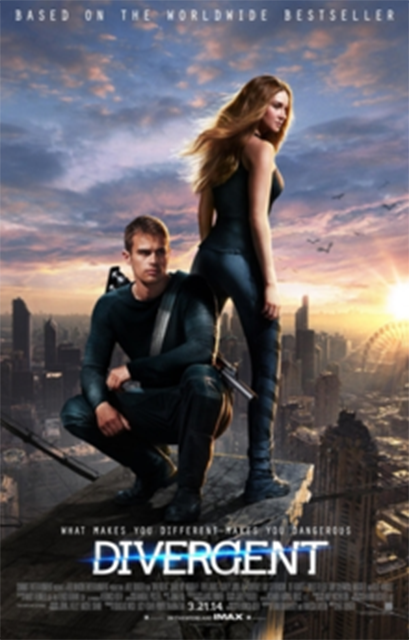Factions that categorize you into your best self, pressures to conform and the suppression of free will – these themes smell like teen spirit.
Well, that is Divergent, the latest dystopian sci-fi blockbuster to supposedly brainwash the young people of the world.
Though the film does have its hang-ups, it fortunately paces like a mad race horse, and it definitely has something worthy to say about putting all your eggs in one basket.
However, if you want the back story of Divergent, do not think that missing the first 10 minutes – because of either traffic or you just really needed that extra-large bag of popcorn – is okay, because you will probably be lost for the next two hours.
The reader’s digest version of the exposition? At 16, by testing, you show aptitude for one of five factions: Candor (honesty), Abnegation (selflessness), Dauntless (bravery), Erudite (intelligence) or Amity (peacefulness).
It’s very similar to being placed in one of the four houses at Hogwarts. Like at Hogwarts, where most people didn’t want to be in Slytherin, it’s safe to say that no one wants to fall into Erudite in this universe. Just as C. S. Lewis once said, “Education without values, as useful as it is, seems rather to make man a more clever devil.”
But there are also those like Beatrice “Tris” Prior, the protagonist, who is a divergent – whose results cannot pin them to just one of the city’s five factions.
The story’s dystopian-personality split society is what’s fascinating because, of course, humans are not boiled down to just one trait. Instead we are many, all at the same time.
Tris’ dilemma then becomes allegorical for the real-life decisions and expectations put upon youth: conform, fit in, choose, choose and choose now. Let me choose for you. Or maybe, just do what I say.
This feeling isn’t lost on anyone who knows what it’s like to be 18, confronted with possibly the biggest decisions of their life – which degree, which college, which profession – and just be incredibly confused and conflicted.
The only real difference between this film’s world and our own is that in Divergent – besides being the left-over remnants of a war-torn civilization – once you choose your path, you can’t change your mind and you can’t go back.
It’s still confusing to me why this absolutely had to be the new law of the land. Something about how changing your mind, otherwise known as free will, disrupts peace.
Yet not knowing exactly how their world got to be the way it is doesn’t really hinder the audience; it’s more like a prelude to whatever will come in the sequels, and it seethes under the surface with the implied chaos roaming outside the city’s towering walls.
Still, when Tris the Divergent chooses Dauntless, there’s this Kevin Hart-like feeling of “It’s about to go down,” and, oh boy, does it.
Knives are flung at her. She’s beaten to a pulp at one point and almost tossed into a deep, dark chasm in another – all while she attempts to fit in within Dauntless.
Amidst the existential questions about free will and finding one’s place, the filmmakers actually use the medium in a very cool way to capture the subjective experiences within the story.
In the main aptitude test and then later on in Dauntless’ mental endurance test, both of which produce drug-induced hallucinations, we are transported into the deepest recesses of the mind.
For Tris, the latter test escalates some of her biggest fears: dying in a horrific way, being used for her body, or having to kill someone she loves for the “greater good.”
How those fears unfold is the cinematic equivalent of a revolving door or a shifting magician’s funhouse. Cowering on swampy ground from viciously attacking crows, Tris sees her reflection in a puddle and then, literally, swims into it. When Tris and Four (Theo James), a fellow member of Dauntless, shares his own fears in a real Inception-like moment, an escape from a 100-foot drop leads into a space that tries to close in on itself.
If you haven’t read the book, you can’t predict how these hallucinations will unravel and the resulting feeling is both unnerving and mesmerizing.
As Four tells Tris, though, fear doesn’t overcome her; it wakes her up. Since the Erudite faction is hell-bent on finding and killing divergents, this places Tris in a dangerous position. Especially as the leader of this witch-hunt, portrayed by Kate Winslet, mobilizes efforts to subjugate those in Dauntless and turn them into brainless, killing warriors.
Shailene Woodley, who plays Tris, is an actress who seems to need big, emotional moments in order to give a good performance. During the key poignant scenes, she unflaggingly nails the intensity of the moment. I was on the verge of tears myself while watching her despair over the death of someone very close to her.
But it’s the in-between acting scenes that are neither here nor there, just sufficient, or where the delivery and the facial expressions fall flat.
Some might argue that entire scenes in Divergent fall flat, that it’s just another teen movie with no substance, or that it’s another step in the fall of “good” cinema.
Well, for me, I like these kinds of movies. I enjoy them. I can get behind characters like Tris, who is both a strong female and conflicted about herself but still trying to work out what the right thing is. And then she fights like hell to do so.
And let’s face it, laser tag meets capture the flag with neuro-stem-whatever darts sounds incredibly fun to watch, doesn’t it?








